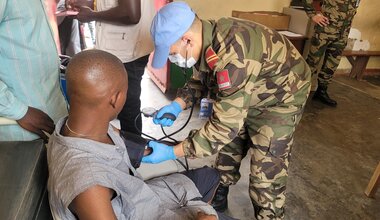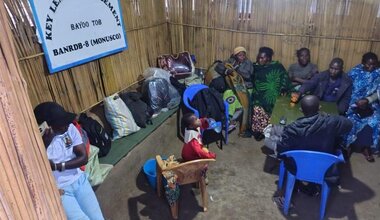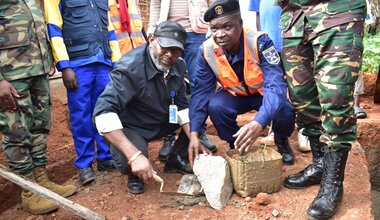SRSG Maman Sidikou’s Statement to the Security Council
5 December 2016
Monsieur le Président, distingués membres du Conseil de sécurité.
Je vous remercie de l’occasion qui m’est ainsi offerte de vous entretenir sur la situation en République démocratique du Congo (RDC) depuis votre séjour en RDC en novembre.
Ma présentation portera sur la situation politique avec un accent particulier sur les bons offices entrepris par la Conférence Episcopale Nationale du Congo (CENCO) et les dispositions prises par la Mission par rapport à l’échéance du 19 Décembre et la situation sécuritaire, en particulier dans la partie orientale du pays.
A deux semaines de la fin constitutionnelle du deuxième et dernier mandat du Président Kabila et plus de six semaines après la signature de l’Accord Politique Global pour l’organisation d’élections apaisées, crédibles et transparentes du 18 Octobre 2016, la situation politique demeure incertaine et volatile.
L’espoir suscité par les bons offices menés par la CENCO depuis début novembre avec l’aval du Président Kabila pour une sortie paisible de l'impasse politique s’amenuisait. Mais dans les situations complexes les apparences peuvent parfois être trompeuses.
En effet, les positions des acteurs-clés notamment de la Majorité Présidentielle et du Rassemblement semblaient ne pas évoluer ; alors que la Majorité Présidentielle continuait de rejeter le principe d’un deuxième dialogue et que le Rassemblement insistait sur la tenue d’un dialogue ‘réellement inclusif, j’apprends par un Communiqué de la Présidence que l’initiative de la CENCO vient d’être relancée par le Président KABILA en personne qui a appelé la CENCO à poursuivre sa mission et l’a assurée de tout son soutien.
Mister President,
While we are steadfastly continuing our good offices engagement with the government, the security services, political parties and civil society, we are now fast
approaching the symbolic date of 19 December and the period going into early next year with a sense of apprehension.
In this context and drawing lessons from the violent events of the 19th and 20th of September 2016, MONUSCO has further updated its contingency plans and is further adjusting its posture and deployment to mitigate politically driven violence and to protect civilians, to the extent possible, within its available resources and in its areas of deployment.
Specifically, the Mission has reinforced its presence and coordination mechanism in Kinshasa to implement our protection of civilians mandate, within capacity, while the Force and Police continue to carry out day and night patrols in Kinshasa, as well as in other parts of the country.
We have also established, in Kinshasa, Goma and Lubumbashi, three mobile teams to monitor and report on human rights violations and restrictions of political space. These teams are designed to deploy into areas without a permanent MONUSCO presence but which are deemed at high risk of politically driven violence.
The Mission is also coordinating its plans with the UN Country Team, in particular with regards to the provision of humanitarian assistance to civilian populations which may be displaced by such violence.
Mister President,
Let me stress here that these efforts may not be fully sufficient to mitigate or respond adequately to any major outbreak of politically-related violence.
First and foremost, it is the political will of the main political actors which will determine how the existing and real tensions are managed, and whether or not these
degenerate into violence.
Secondly, the Force and Police capabilities available to the Mission in Kinshasa are stretched thin. In addition, as the Mission fine-tunes its plans to ensure the safety and security of its personnel and facilities, we are cognizant of the fact that there may well be requests from the diplomatic community and other actors present in Kinshasa for support, which would further stretch the Mission’s limited capacities.
My senior colleagues and I will continue to work with the Secretariat to address these challenges and I am grateful for the support of this Council on these matters.
Mister President, distinguished members of Council, Going forward, it is my hope that the efforts of the CENCO, with the support of countries of the region, in particular the Republic of Angola and the Republic of Congo, would eventually broker a rapprochement between the Presidential Majority
and the Opposition Rassemblement.
Such a rapprochement would contribute to averting violence on 19 December and in the period immediately thereafter, and in the medium term also contribute to a
peaceful transition process required for a credible electoral process.
I would therefore like to encourage the Council to reinforce the message it conveyed to the Congolese political actors during its visit to the DRC last month, namely that they remain primarily responsible and accountable for the peace and stability of their country.
I hope that the Council would also express its appreciation for the efforts of the CENCO to facilitate a détente between the Government and the Rassemblement.
It is also important for the Council to urge the Prime Minister designate, Mr. Samy Badibanga to conclude his engagements with all stakeholders in order to form an
inclusive transitional government, which would promote a spirit of reconciliation and lead the country through a peaceful and stable transition period.
Mister President,
I would like to conclude by highlighting that in this period of political uncertainty, the deteriorating economic situation is also having an adverse impact on the stability of the country. Socio-economic factors constitute an important potential trigger for violence in this period.
I would therefore like to echo the Prime Minister-designate’s personal appeal to me when I met with him on 1st December requesting international community support as his government intends to re-engage the international financial institutions in this regard.
Finally, Mister President, distinguished members of the Security Council, we must beware that the focus on political events in Kinshasa and our preparations to mitigate elections-related violence do not detract from our operations against armed groups in the East of the country.
The situation in the Eastern DRC remains cause for concern and could well be exacerbated by armed groups and criminal networks capitalising on the political
uncertainty at the national level, compounding the risks faced by the civilian population.
The spill-over effect of the ongoing conflict in South Sudan, the growing number of South Sudanese refugees arriving in the DRC, and the presence of armed actors along the South Sudan – DRC border are also of increasing concern. We must continue to monitor these developments very closely.
MONUSCO will therefore continue in a determined manner in its coordinated operations with the Congolese armed forces against armed groups to ensure the
protection of civilians in the eastern part of the country and with the Congolese police to strengthen the rule of law.
On regional matters that impact on the DRC, I will also continue my close coordination and collaboration with SESG Djinnit in our diplomatic efforts at regional level.
Thank you.
,hr>
 UN
UN United Nations Peacekeeping
United Nations Peacekeeping






